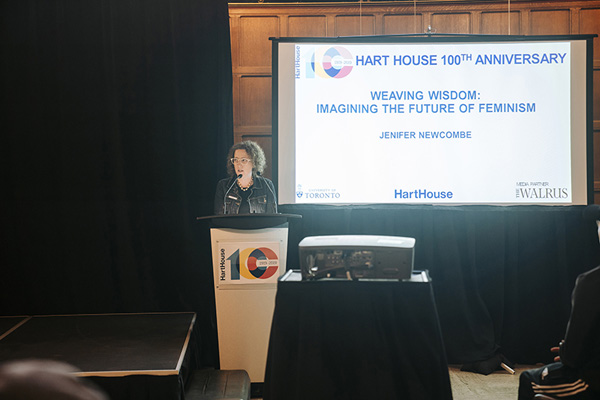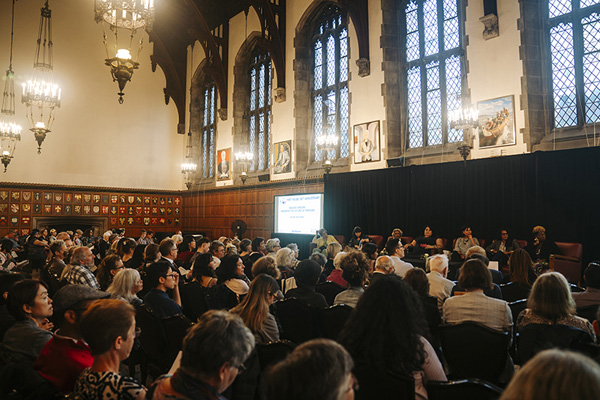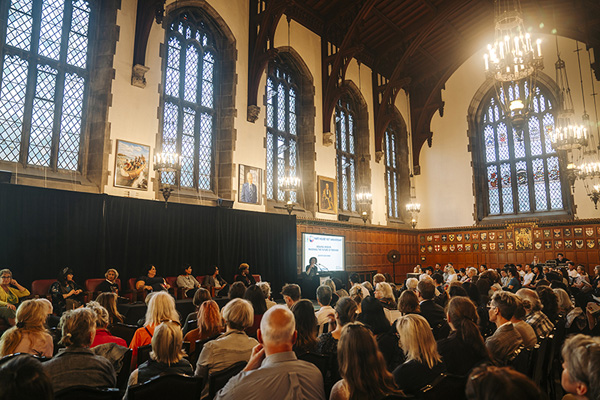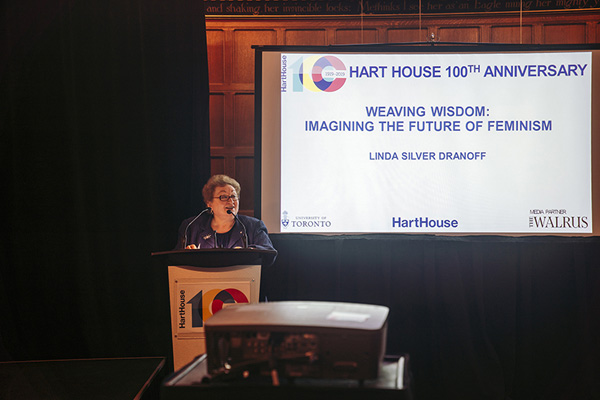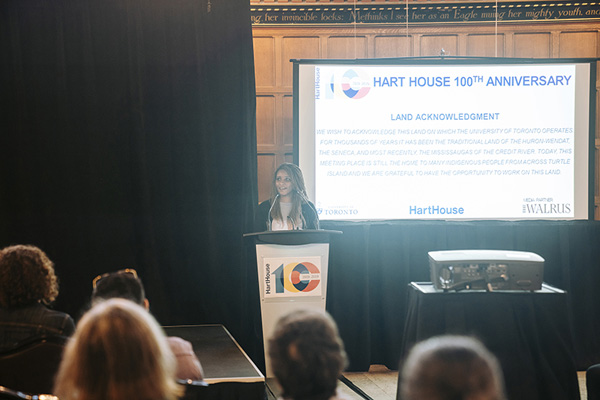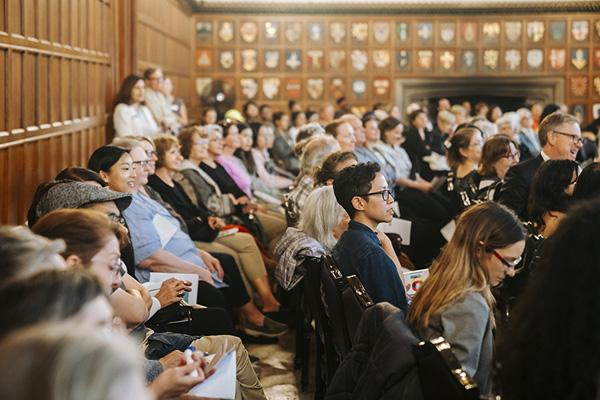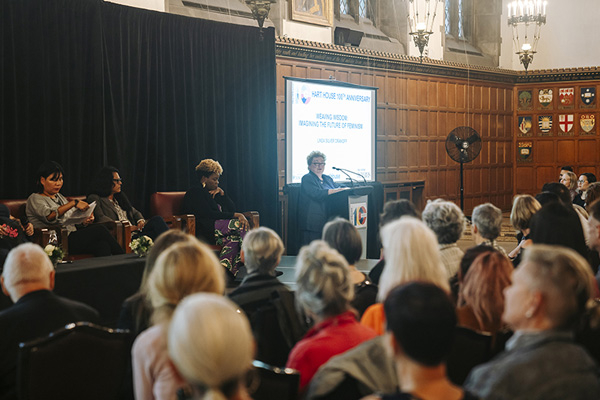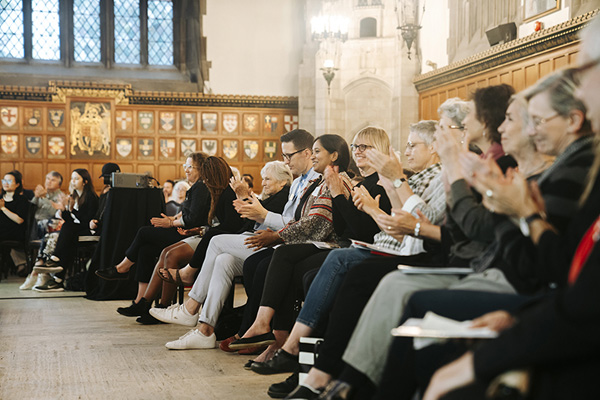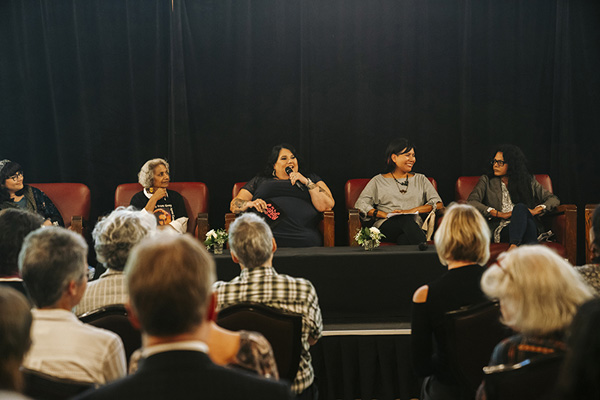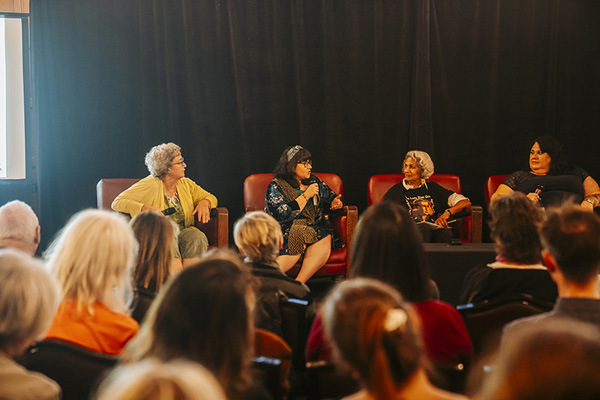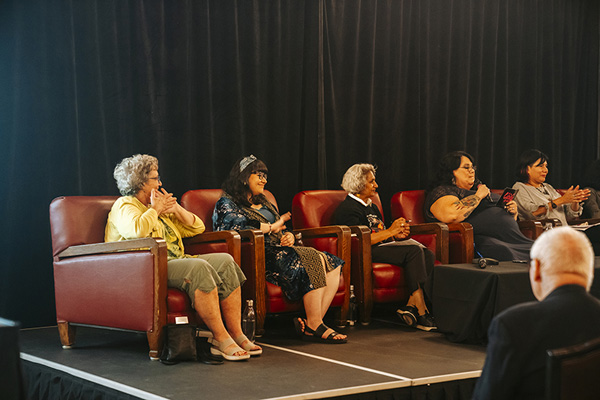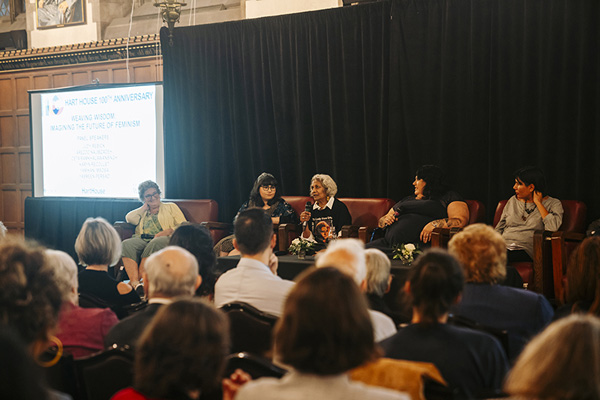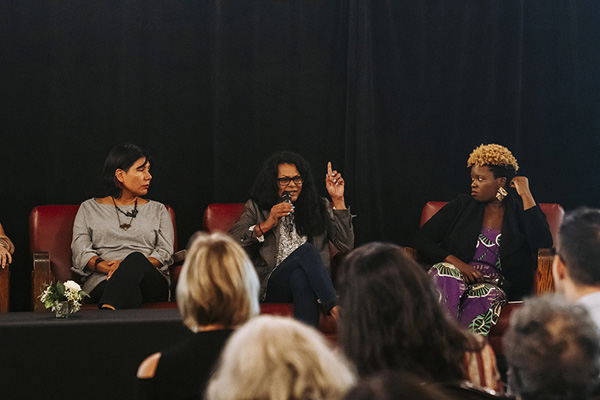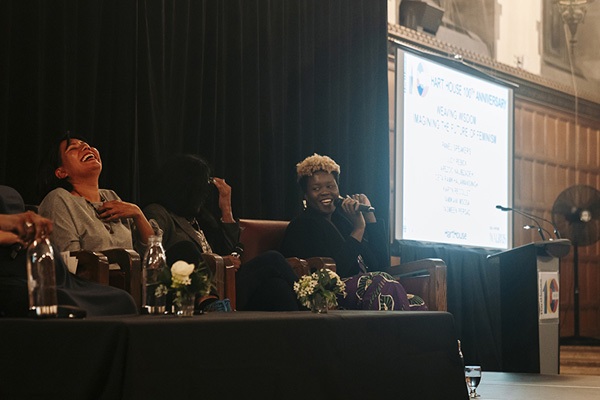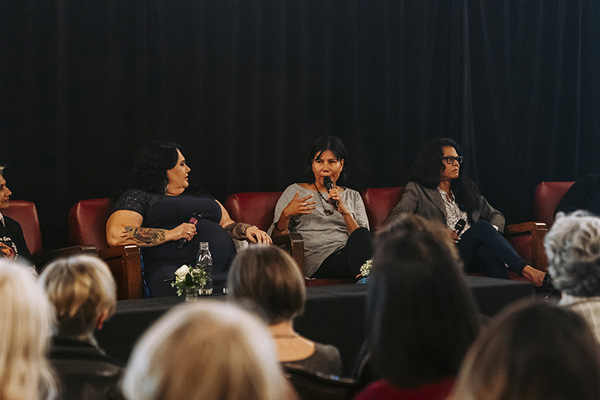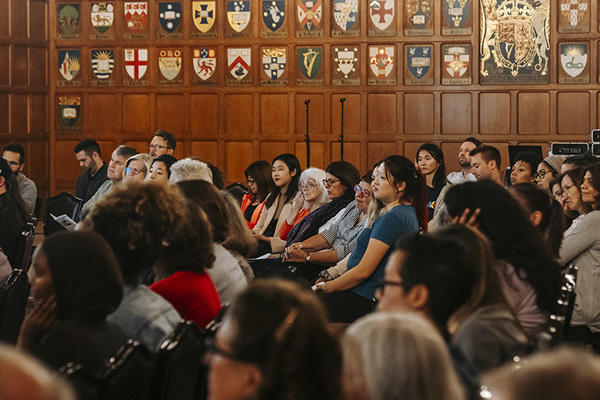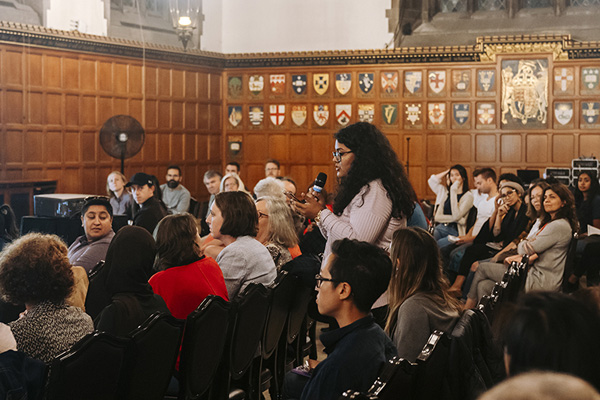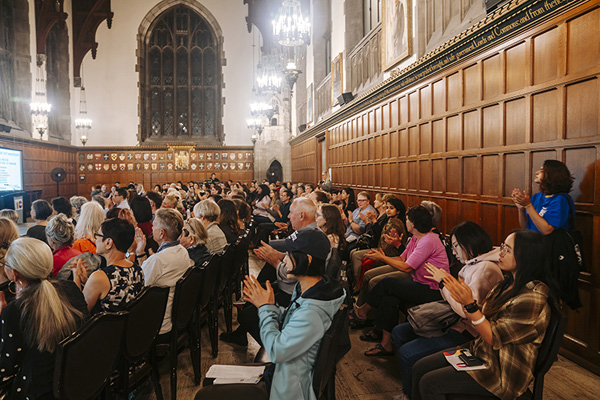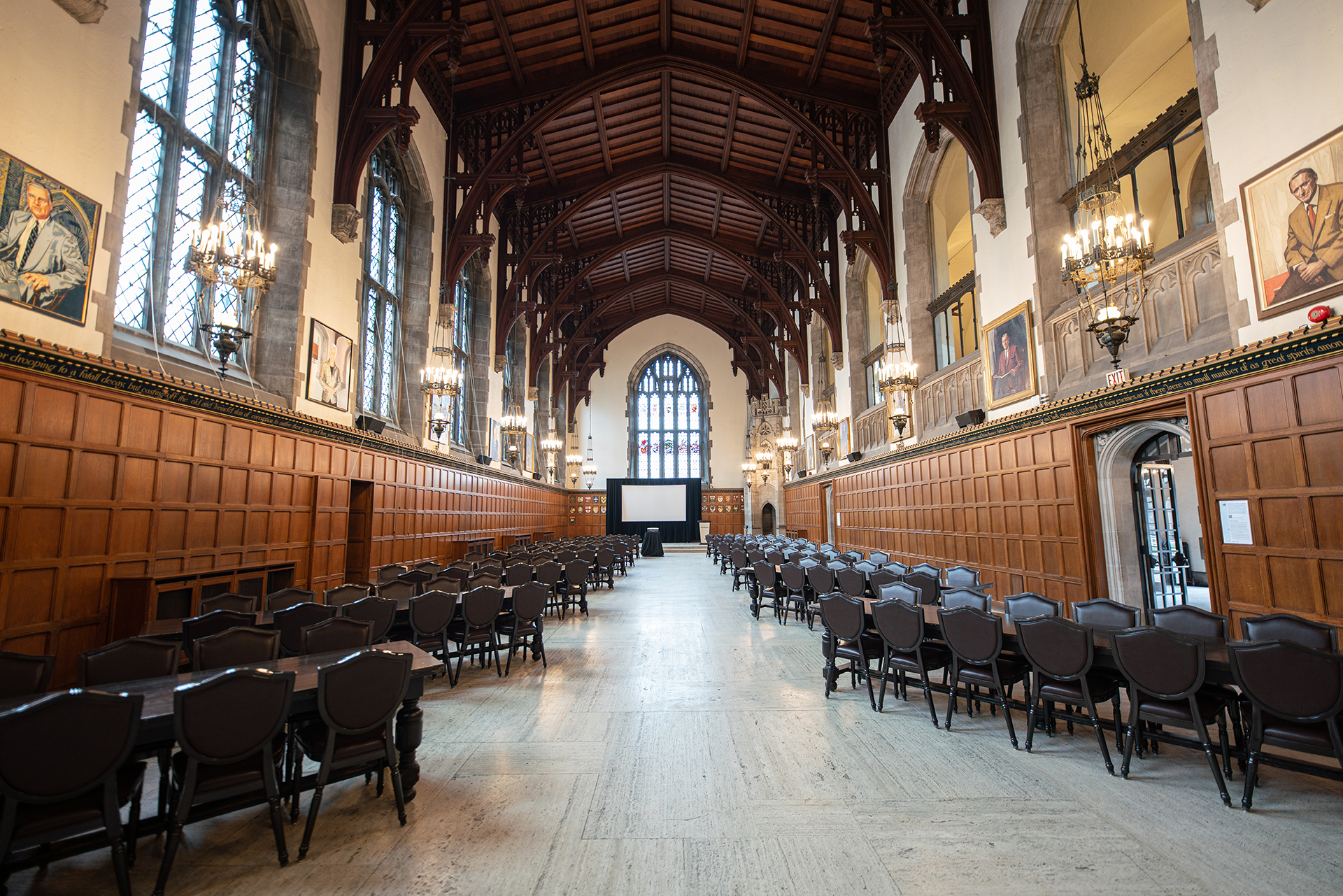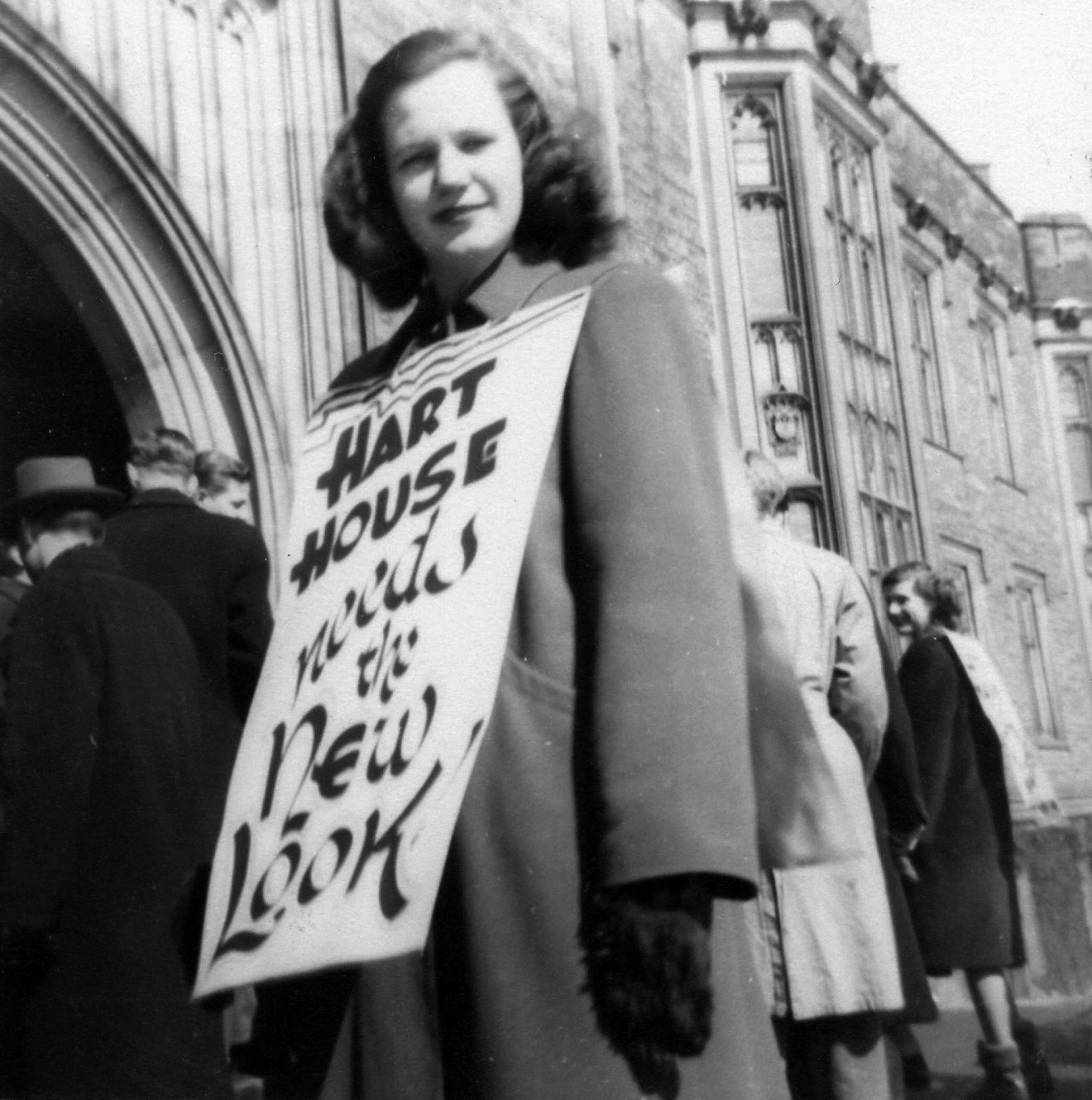
Despite improvements made in the past century around women’s rights, the growing demand for equality in response to the urgent issues we face has pushed dialogue around feminism into sharper focus. What does the future of feminism look like?
Listen to the Podcast
The second event in our Centennial Dialogue Series, Weaving Wisdom: Imagining the Future of Feminism took place on September 10, 2019. This recording captures the evening's discussion.
Part 1 features the introduction to the event with Jenifer Newcombe, Ruvimbo Mutangadura and Linda Silver Dranoff.
Part 2 features a conversation moderated by the always compelling comedian and activist Candy Palmater and including Judy Rebick, Yasmeen Persad, Karyn Recollet, Yamikani Msosa, Ceta Ramkhalawansingh and Arezoo Najibzadeh
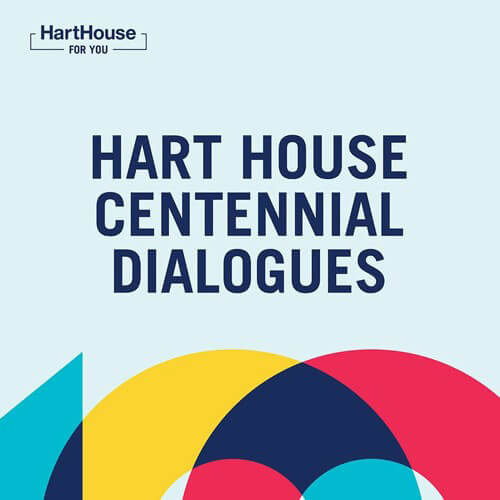
Weaving Wisdom, Imagining the Future of Feminism Part 1
Read Transcript
Ruvimbo: Hello and welcome to The Hart House Centennial dialogue podcast. We are grateful to live, work and study on Dish with One Spoon Territory. I'm your host, Ruvimbo. Each episode will feature public dialogues that took place at Hart House on the University of Toronto campus as part of a special series of public events marking Hart House’s hundredth anniversary, and inspired by our legacy as a key site for dialogue, debate and conversation. Today's episode will feature excerpts and reflections from Weaving Wisdom, Imagining the Future of Feminism, which was an intersectional, intergenerational conversation, inspired by a 1929 debate hosted here at Hart House that featured Canada's first female MP, Agnes MacPhail, debating the resolution, the House Believes the Emancipation of Women has been a Failure.
Jenifer: I would like to welcome everyone to this evening's event, Weaving Wisdom, Imagining the Future of Feminism. This event is the second in a series of four dialogues that we're hosting as part of our 100th anniversary year of Hart House as a student center for dialogue, the arts and wellness at the University of Toronto. Each of these four Centennial Dialogue events takes inspiration from a significant discussion from Hart House’s past. Tonight's event responds to a 1929 debate hosted here at Hart House that featured Canada’s first female MP Agnes MacPhail debating the resolution, This House Believes the Emancipation of Women has been a Failure. That debate took place at a time when Hart House was not open to women. And it was more than 40 years later in 1972, before women successfully challenged that exclusion. And those essential questions around gender equality remain, around addressing sexual and gender based violence, missing and murdered Indigenous women, the full participation of women in our political and economic life, reproductive justice, around the essential interconnectedness with issues of gender, race, class and identity, and ultimately about how we work together in solidarity. As we embark on our second century, we want Hart House to be a place where all students see themselves, their communities and their truths acknowledged, embraced and reflected back at them. And that's particularly true with respect to students who have not always been well represented or have been excluded from the space. A final comment before I hand the mic over for the opening of the event, I just would like to acknowledge the partnership and the support of a number of folks who've contributed to this evening, and they include the Sexual Violence Prevention and Support Center, the Anti-racism and Cultural Diversity Office, who are our partners on this event, alongside many other students and colleagues, including those from the Sexual and Gender Diversity Office and the Hart Houses Debates and Dialogue Committee, who contributed to planning and thinking about tonight. We are also honoured by the presence of so many wise and accomplished women who will be contributing to this evening's discussion, so we're grateful to our invited panelists and to everybody who's taking time to join us here this evening, to listen to learn and to join the conversation.
To start the evening, I am really thrilled to invite Ruvimbo Mutangadurato, to offer the land acknowledgement to the open the event. Ruvimbo recently graduated with an MA in political science, and we had the pleasure of working with her as a dynamic member of the Hart House podcasting team, which is a group of students who work together and share stories of transformation and lived experience from young people. As a black African woman, the stories Ruvimbo was interested in highlighting were those that focused on dismantling and challenging the traditional monolithic narrative of Africa and other places that are not of the West, as well as stories that show the agency, strength and intersectionality of women of color. Ruvimbo currently works at an NGO called Anita that helps provide access to education for women and children in Ghana and Jamaica. So please join me in welcoming Ruvimbo to the stage.
Ruvimbo: Thank you for that wonderful welcome, Jen. We wish to acknowledge the land on which the University of Toronto operates. For thousands of years, it has been the traditional Land of the Huron Wendat, the Seneca and most recently the Mississaugas of the Credit River. Today, this meeting place is still the home to many indigenous people from across Turtle Island. And we're grateful to have the opportunity to work on this land. And as a settler on this land and coming from a territory that too has suffered from destructive colonial and neo-colonial practices. I stand in solidarity with indigenous communities across Turtle Island. And I vow to continue learning my obligation as a guest on this land while also making concrete positive and disruptive change. For those of us that gather here at Hart House, from the various paths that have led us here, may we work to listen, to learn and to use the power and privilege we have to make space, to make mistakes, to persist and to make change.
I was asked the question what makes feminism meaningful to me, and as you will have heard from my bio, as Jen said, I grew up in an African family of all girls, I am one of three sisters and in the culture that has privileged male children over female children, I saw my parents standing up for me and my sisters for our right to education, for our right to experience the world, to travel, and to even dream big. And oftentimes, they were challenging relatives, people that I spent Christmas dinners, with that I spent Easter with, who very much had voiced antiquated and patriarchal views against how we were being raised. And so coming from a culture where I'm constantly asked, When are you getting married? Where's your husband? You're 25 you need to have kids now. You're pursuing a master's degree? You know, men don't like intelligent women, right? My parents have constantly advocated for my rights to navigate life on my own terms. And although I didn't always have the vocabulary for it, when I was younger, I realized now that that was feminism in action, and although it was on a small scale, I wouldn't be here without it. And it's sometimes those small changes and disruptions to the status quo result in the biggest waves of changes. And we still have a long way to go.
I realize I'm talking from a point of privilege. Not many people who look like me have had this opportunity. We cannot talk of holistic feminism without addressing the need for intersectional feminism. There is no conversation unless race, class, socio-economic status, disability justice, sexual orientation, postcolonial feminism and recognizing and acknowledging the rights of women to choose what they would like. And sometimes that may look like being housewives, being homemakers, and that's okay. All of these elements must be brought into the conversation of feminism. We also cannot have blinders on to the struggles and the fight of women who are outside the Western world. And because of my positionality, like I've mentioned before, this is a struggle that I can relate to on a personal basis.
Just last week, just this past week in South Africa, thousands of women gathered in protest against gender-based violence, rape and femicide, after the rape and murder of a 19-year old university student who was simply going to the post office to collect a package. She wasn't dressed provocatively - but even if she had been. She wasn't drunk - but even if she had been. She was assaulted for being a woman. Her body and her life were taken at the expense of someone who thought they had claim over it. And I wish I could say this was a tragic one time horrific act. But it's something that has become an almost permanent fixture in the fabric of South African society and in many other developing countries in the world. And we have to help our sisters, whatever privilege we can exercise, to that end, this would be the time to exercise it. And this isn't to discredit how far we've come. I mean, before 1972 women can even be in this building that we're in today. And my being in the space in this very moment, a small kid from Zimbabwe is as a result of the labour of many women that came before me, one whom I had the pleasure of introducing and calling up to the stage right now, have done. This woman has worked tirelessly for most of her life, and advocating for the rights of women. As a student activist she fought for women's access to Hart House at a time where not many people were fighting for women in any regard at all. She has continued to advocate for women in her work as the lawyer, making waves in the legal system by pressing for social justice and law reform and the range of issues affecting women. As the saying goes, she has walked so many of us in this room can be able to run. Be sure to also pick up a copy of her new book "Fairly Equal: Lawyering the Feminist Revolution”. Please help me to welcome up Linda Silver Dranoff.
Linda: Thank you very much. Hart House and I go back a very long way. I don't like to count the years but they're there. When I entered the University of Toronto in 1957, I was the first female in my family to do so. Hart House at that time was closed to women. Slammed shut, in fact. It's men- only status was a condition of the gift to the University of Toronto in 1919, by the Massey family, in memory of Hart Massey. Women accepted it, because that's just the way things were for us in that era. Well, we sort of accepted it. Until we heard that senator John F. Kennedy, touted to become the next President of the United States was coming to Hart House to participate in a Hart House debate. And he was going to debate student Stephen Lewis, even then and oratorical star. Some of us girls, we did call ourselves girls then, some of us girls wanted to be there. By then Hart House was reluctantly opening one debate a year to women. So a group of us made an appointment with Warden Joe McCauley to ask, oh so very nicely and in such a lady like manner, that he should pick this debate for us to participate in. No, he said, without an explanation, bemused at our interest and dismissive of our interest and very definitive. No. We said Thank you and we left. I told you we were very ladylike. But we didn't take his refusal as a final word on the subject. We decided to protest. I wrote a letter to the editor of the Varsity demanding "It's time for a change. Women let's get together and fight." The headline they gave it was “Dogmatic Approach - Time for a Change". And a group of us picketed in front of Hart House. In fact, just outside an open Debates room, window and chanted the words and our signs held high, equal rights for women, and unfair. Those inside heard us and knew that we objected. They didn't seem to care. Even John F. Kennedy approved of us being kept out. As the newspapers quoted him the next day, he said, "I personally rather approve of keeping women out of these places. And it's a pleasure to come here where males are not afraid to say what they think of the opposite sex." You know how many women voted for him in 1960 and made him president?
At that time, there was no feminist movement. The word itself was unknown to me. We protesters were not knowingly starting any kind of movement. But the unfairness was so evident to us, and the event, which was my first experience of activism for women's rights ignited a fire in me to fight unfairness against women. The exclusion of women from Hart House in 1957 was a demonstration of the role to which women had been relegated over the centuries, a role that was ingrained as part of the culture. The fire it lit in me didn't take long to fire up again. One year later, it was announced that the one debate a year was going to be open to women and it was called I was done on the subject "Now is the time”. That's a really fascinating subject, right? With a lot of really meaty complex issues. Anyway, now is the Time" was the debate that was going to be open to women and I could not resist attending. I arrived to find that I was required to sit in a separate roped off area designated for women and told to be quiet. The chair in fact announced that women were present on sufferance only. When I nevertheless stood up during the discussion period to raise a point, the chair refused to recognize me. I remain standing silently for about 10 minutes before he finally gave in and let me speak. The Varsity reported the incident with this headline, "Upstart Co-ed Upsets Lighthearted Debate."
Well, this upstart stood up for the right of women to be heard. My next experience and there were three, challenging the patriarchy at Hart House, took place 15 years later, it was 1972 and Hard House was finally open to women, after more and more women had objected to being excluded. I heard about it and decided to be there on the first day. A male friend joined me for lunch at the Arbor Room. It was there that I looked for washroom and found none designated for women. So, I liberated the men's washroom with being cautious, my friend standing guard. And here I am, and it's 2019. And I'm speaking at Hart House, and I indeed have been invited to do so. And welcomed. It shows that change is possible and is worth our effort. In the years that followed my early protests, I became a lawyer and learned both about injustice and about how to fight it. Using the rational tools of the law, I learned about systemic discrimination against women that was and is built into the very structures of our society. I learned that too many women blame themselves for their inability to succeed, and didn't see that systemic problems require a systemic response. Family Law did not protect women. Employers practiced open discrimination, criminal laws made contraception and abortion illegal. Childcare was assumed to be a woman's job with no help from government. Politics was a men's game, and women were subjected to harassment and violence without protection by the laws or the legal system. This was life, and life made me a feminist.
Since the 1970s, many women joined together to fight all this inequality and unfairness. And we accomplished significant changes. Family Law Reform, charter equality rights, decriminalized legal abortion, maternity and paternity leave, laws against sexual harassment, laws requiring actual consent to sexual relations, pay equity laws, pension sharing rights, shelters and programs to help women who are poor, homeless, disabled, and those who suffer violence and more. These things that we changed, helped improve the lives of women of every race, class identity, and ability, and of that we are so proud. But I always encourage everyone not to take these achievements for granted. The struggle is ongoing. We have to remain vigilant to maintain these advances and to forge ahead with new ones. We still don't have government support for enough affordable childcare places. We've had pay equity law since the 1980s, and there's still a 30% wage gap between men and women. Women continue to struggle for our proper role in politics and in corporations. We achieved Family Law Reform, but legal aid is being crippled. We achieved progressive changes to rape laws, but a victim’s real-life experience within the legal system continues to be mostly traumatic. Adequate funding for shelters for women escaping violence is still a dream. And violence and harassment is being finally confronted by the MeToo movement. And we must support that effort. Today our panel of activist women are going to talk about the future of feminism.
I for one, and I don't like to lose an opportunity to put the idea forward - I for one, believe that we need a new national women's organization, like the National Action Committee on the Status of Women was in its heyday, because we need to join together all of us, in sisterhood, to talk with one voice for the good of all. I hope all of you will play a role in resolving systemic problems and ensuring equality for all women in the future. And I encourage all of you to accept proudly, as I do, the label of Feminist.
Ruvimbo: So, in case you’re wondering what Futurism means, it’s an exciting and emerging branch of scholarship for those communities who have been mired and silenced by oppression, such as indigenous folks, folks of colour, and gives them the ability to harness their liberatory power to write and create and imagine their own futures on their own terms as an act of resistance and solidarity.
I was very honoured to be able to participate in this conversation, and just being in that room full of inspiring women who had so many interesting things to say about this movement made me think of my own positionality - being a woman of colour in the global north, coming from the global south, and how I must continue to be an advocate for the people in my communities. For a lot of people, the global south tends not to be included in this discussion about feminism, and for me, I would like to take all the insights, and everything that I’ve learnt, and my privilege, back to the places that I’m from, that might need it the most.
We are grateful to our invited panelists and everyone that has taken the time to join us in person and via our podcasts to listen, to learn and to engage in conversation. This event would not have been possible without the partnership and support of a number of folks that include the Sexual Violence Prevention and Support Center, the Anti-racism and Cultural Diversity Office, as well as the Hart House Debates and Dialogue Committee, who contributed to planning and thinking about tonight. A special thanks goes to Jen Newcombe and the team at Hart House that helped to produce the Centennial Dialogue Series. Thank you for listening to excerpts from Weaving Wisdom – Imagining the Future of Feminism, but don’t let it end here. The future of feminism needs all of our unique voices and actions, big and small.
Please check our other episodes from the series. Each of these four Centennial Dialogue events takes inspiration from a significant discussion from Hart House’s past. To hear more episodes from the series, please visit our website at www.harthouse.ca.

Weaving Wisdom, Imagining the Future of Feminism Part 2
Read Transcript
Part Two
Ruvimbo: Hello and welcome to the Hart House Centennial Dialogue podcast. We are grateful to live, work and study on Dish with One Spoon Territory. I’m your host, Ruvimbo. Each episode will feature public dialogues that took place at Hart House on the University of Toronto campus as part of a special series of special events marking Hart House’s 100th anniversary, and inspired by our legacy as a key site for dialogue, debate and conversation. Today’s episode will feature excerpts and reflections from Weaving Wisdom – Imagining the Future of Feminism, which was an intersectional, intergenerational conversation inspired by a 1929 debate hosted here at Hart House, that featured Canada first female MP, Agnes MacPhail debating the resolution, the House Believes the Emancipation of Women has been a Failure. And now, in 2019, those essential questions around gender equality still remain.
Moderated by Candy Palmater, who is a recovered lawyer turned feminist comic and award-winning TV and radio personality. The following were on our list of A star panellists, Judy Rebik, who is a well known social justice and feminist activist, writer, journalist, educator and speaker. Ceta Ramkhalawansingh, who is a human rights advocate, community activist, feminist and former city councillor in Toronto. Arezoo Najibzadeh, who is the co-founder and executive director of the Young Women's Leadership Network and the leading voice for women's civic and political participation in Canada. Next, we have Yamikani Msosaa who is a grassroots feminist, anti-violence, anti-racist organizer, equity and diversity consultant and movement-based practitioner. We also have Karyn Recollet who is an Assistant Professor in the Women and Gender Studies Institute at the University of Toronto and an Urban Cree residing in the traditional territories of the Petun Wendat, Mississaugas of the New Credit Dish with One Spoon Treaty Territory. We also had Yasmeen Persad, who is a trans woman of colour originally from the Caribbean. She is a member of the Five One Nine Education and Training Team. To start off our conversation, Candy asked our panellists, what is feminism to them? And these are some of the answers they offered.
Judy: So, feminism for me, is it a revolutionary transformation of society where men don't control everything anymore. And where women bring their experience and their knowledge across all diversities into society in a positive way. So, for me, it's a very revolutionary thing. And how did I come to it?
Candy: How did you get there?
Judy: Well, I was expelled from ballet school when I was seven, so that was part of it, I think. But, I think the major thing that made me a feminist was that my mother agreed to move from Brooklyn to Canada because of my father when I was nine years old, and I did not want to go. And I didn't understand why a decision like that should be made by the man. And what my mother, and what we wanted, shouldn't make any difference. So that's, I think that's the moment when I became a feminist that I was not going to give into that. I mean, I didn't have any choice there, but in the future…
Candy: Yeah, well, Brooklyn's loss was Canada's gain.
Judy: Thank you.
Candy: Thank you for that.
Arezoo: For me, feminism is a process. It's a movement for liberation for all people, I think. I've been struggling with this institutional corporate mainstream feminism that focuses so much on gender equality and the 50/50 process and usually, it erases black and indigenous and gender diverse and disabled folks. So I think for me, before anything else, before that equality between men and women, is really having a liberatory conversation about what the goal of this movement is going to be and what type of future we all see as a collective. And I think I struggle with the label “Feminist”, I definitely support that sentiment, but again, as an Iranian woman, as an immigrant settler on Turtle Island, I definitely realized that my liberation and the history of where I come from, and the history of that feminist sentiment that I have, is not the history shared by a lot of white women, by a lot of Canadian women who claim the label. So, I think we should all be mindful of whether or not we support, encourage or demand that everybody claims that label. And, it's because I don't have a choice. I don't have a choice but to support the sentiment, you know, as, again, as a young woman who was violently driven out of our political institutions by sexual violence, I really don't have a choice but to be a feminist and to demand my political voice and my public voice through feminist activism.
Ceta: I agree with the two previous speakers about what feminism means really, it is about social transformation. It is about changing the power structures and outcomes in society. Now, how did I come to it? It was an accident, I think, and it was about the kind of experiences you run into along the way. I attended an all-girl High School in Trinidad and Tobago, and you know, the power of sisterhood really got grounded in me at that point in time. So I'm a firm believer in single-sex High School, certainly for women. And now, when I landed at the U of T in 1968, not too long after Linda, my very first political meeting in my first year in the fall of my first year, was actually here in Hart House. I was on my way to attend a meeting dealing with discrimination against women in the sports program.
And shortly after that, I became involved in student government and the student government I was involved in at that time, this would be 1969/1970, was an activist student government. So we did things like help fund the abortion caravan to Ottawa, distributed birth control handbooks to all the first-year students at the University, cut the funding for the cheerleaders and all the football banquets and stuff like that. So, the questions at that point in time really had to do with the distribution of money, and about participation in decision-making and governance within the University. And it was that same year that I became involved with my friend Kay, (who loaned you her glasses), in advocating for the establishment of a Women's Studies course, the first course at the University of Toronto. And the kind of lessons that we learned along the way, had, you know, in terms of the future, had to do with the importance of developing a feminist analysis, having structures to operate these programs and making sure there was expanded research and publications. And that's the kind of trajectory that's happened in the last 50 years. And I'll stop right there.
Karyn: So I have experience of coming into my family in Sturgeon Lake First Nation in Saskatchewan. And, for me, how I came into this space was through being offered kinship and relationality with folks that I cared very deeply about and they cared about me. So, for me, coming into this space of indigenous feminism and, and indigenous feminist theories and thought came about as a series of embraces by folks that I love very deeply, and cared about and it's started kind of happening where some of my friends would, we would hear that something happened to them and I started to be afraid. And I started thinking about, you know how a lot of indigenous folks that I, you know, that had been in my orbits had started to go missing. And when I started thinking about, you know, my own fear, and working through that in relationality, with some of my mentors and some of my kinships and some of my friends, it just led to this kind of embodiment of care, that, for me is an expression of what it means to be a conduit for care. And that's how I came into the relationship.
Yasmeen: Good evening. I'm feminism from me, really relates to my trans identity. But it goes beyond that for me. I think of it because I think of what I’m hearing this evening, hearing about the historical context. I feel like I can’t go forward on feminism, I have to go back for it. Like I have to relate it to a lot of the trans woman of colour, the indigenous, two-spirit trans women who actually who passed away and who passed away because they weren't included in quote/ unquote, feminists and feminist movement and I’ve had the opportunity to talk to many of them, and when the word came up, however, to them, there would always be like a pause, and we're like, "well, you know, we're not getting in there. We're not going in”, you know, there's a question mark, an exclamation mark that (inaudible) and, and because of that, they weren't included and because of them, I guess I'm included in some way, which I guess we'll talk a bit about as the conversation goes on, and how it relates to trans identity, trans women of colour indigenous two-spirit, trans woman, newcomer trans woman, refugees, sex workers. And, you know, as we talked about these multiple intersecting identities, what does that mean? And what does it mean in the context of feminism for me?
Yamikani: So my entry point into the feminist movement was through white liberal academic feminism as a Women and Gender Studies student. I’m from Ottawa so you know, a lot of my, I'm not going to call it indoctrination, but collectively bringing me in was with folks that didn't necessarily represent communities that I was a part of. So, then my entry point was there. And then you know, I don't necessarily identify with feminism, I identify the feminist principles. I think womanism was my, you know, there were like multiple convenings, right? And so when I was introduced to womanism by a radical community organizer in Ottawa, I was like, Oh, I was like, I really messed with this. Like, I think this is really dope. And I think it aligns with who I am as a black, queer, really fucking with gender at the moment, human being.
And so, you know, I think that the people who brought me into the feminist movement initially, were very privileged and, and it's interesting because it wasn't until I volunteered at a community-based organization in Ottawa, that they're like, “I need you to leave all of that at the door.” Because none of this, right, if you're going to work in the community, you need to use accessible language, you need to be able to recognize the communities that you're working with, and so I think for all intents and purposes, I'm a womanist. I am someone who believes in liberatory practices, de-colonial practices, there are elements of black feminism that I aligned with. And I think that for me, yeah, I'm just gonna stop there.
Candy: What I want us to start talking about now is, you know, a couple of the panellists mentioned intersectionality. And, and if I think back through my 50 years, you know, when I was young, I felt like the older women didn't think I had, that I had lived enough years to stand up and take my place at the microphone. As I moved on and did some work with the Status of Women in Nova Scotia, I suddenly realized that all women don't think the same. And, it was a bit of a rude awakening how often I got in arguments when I was on that on that panel, and for me as an indigenous woman, I find both homophobia and misogyny. I got to start fighting at home with that, right at my front door.
As a comedian, I tell a joke about vagina augmentation. And I was hired to come into a small community in Nova Scotia. And I did that joke and in that joke, I say labia and vagina. And a male comic, a male indigenous comic, started a hate campaign the next day and said that I was not an indigenous comic, because I was talking about dirty things and how offensive it was. And I mean, everybody in the community piled on about how offensive that was. Interestingly, the Chief of that community had five years previously gone to Halifax casino, put roofies in two women's drinks, took them back to his room sexually assaulted them, was convicted, served five years, came out and they re-elected him. And that was not offensive to their community, but my labia and my vagina was. Yeah.
So what I want us to talk about now is we all come at womanism or feminism from our own perspective, and over the years, some voices have been muffled. As we move forward, it's interesting, we just had this conversation this summer at another event that I was speaking at, in the queer community around who's got the microphone all the time. I'd like you each to reflect on the state of the movement as it is now. And who needs to be brought to the microphone? Who is it that we think is not being heard or represented by the movement? There is a large part of the feminist community that believes that trans women don't have a place at the table. That because of the privilege of being born with a penis, that that sets you apart. We have to talk about those issues because that is there. There are people who feel that class plays a huge part. How do we make it work while we're also agreeing that we're going to disagree? And I mean, I would push it so far as to say and think about this as you speak. I just did a thing with Sheila Rogers the other day, and I mentioned Margaret Thatcher, because as a child when I thought I was going to be a politician, I looked up to her. And she goes, "Oh, my God with her policies?" I said, "Yeah, yeah, with her policies. I don't agree with her policies. I don't agree with her politics. But Hello, she was a woman who made something happen at a time when that just wasn't happening." And for me as a 15-16-year-old girl, I could set aside the fact that we politically disagreed, and just say, wow, you know, Thanks for breaking that trail. Hopefully, somebody can come up behind you. So as the rest of you climb in on this conversation, you know, don't shy away from those difficult places, where, whether it be race or class or your identity or what have you.
Yasmeen: So Candy, just as you, it seems like, you know, it's right up my alley, literally. But I think first and foremost, it has been that debate for a long time, based on privilege and identity. And, let's not first reduce trans women to body parts because that's dehumanizing. So when we start referring to people who have penises and all these very sexual organs, we really start to dehumanize people because we don't know what people have, right, so we haven't even started to talk about intersex people in the conversation yet. That's a whole other, you know, there's a representation clearly. So I think that has been one of the most and I think most people here know that I don't have to say that openly, has brought up the barrier or the gatekeeping for, oh, a trans woman can’t come in here because, and that has always been a misconception. It's been a barrier for people who want to control, take control, keep control and never let go.
I've talked to non-trans women have a lot of black cis woman friends who work in the field, who are feminists, and they don't see themselves represented and they tell me that all the time. You know, I have a friend, a mom, a black woman from Trinidad and Tobago, came here as an immigrant working in the shelter system, would pull an overnight, two overnights and then she would go to work have to deal with some other sort of white co-workers was giving her drama, and she's like, Not today. Not tonight, you know, and she felt really excluded. I've heard the history of other black women who I've worked with, Dr. Akua Benjamin talk about how the feminist woman at that time in the 60s, (she came to Canada from Trinidad also). And she said We weren't allowed. We weren't given the space to say, No, Akua, not today. So I think all these histories come in and we talking about it. But really, when we talk to the day to day people, trans people about what that means, people still say, look at the Michigan Woman's Festival, and trans people can’t go there. Oh, right.
There are still places that trans women can't access just because of who they are. So it's not just about a feminist movement, it's about access. Right? If you can't access that bathroom, then all of this stuff isn't – it's not gonna work. It's not working. Right? If a person with a disability can't get into building I can be the feminist from all that I want to do tomorrow. Till the whatever, 100 years. But if you can’t get in the building and we're really not, we're not doing what we say we are, or who we are. And that's the piece that I feel is missing. It’s representation and accessibility.
Candy: Yeah, thanks for bringing that up. I like that concept of access.
Yamikani: Just gonna say that I think that one of the things that feminism, mainstream feminism is really fixed on that like, just is wild to me is this notion of inclusion because the notion of inclusion is already a predetermination that I need to be included into something. When the reality is I don’t. I have movements that I'm already a part of, and there's black, queer, trans, non-binary people that actively choose not to participate in feminist spaces, right, and then there's always this constant conversation about what we need a NOW, or a NAC. And even then, there were radical folks that were like, “Fuck this.” And the reason why they said, “Fuck this,” is because, one, over the years, obviously I'm not I'm still young, relatively I feel very jaded, but there's this over-reliance of the state. Why the fuck would I want to do something or organize where the state is funding me, therefore has a role in what I can and can't do.
We need to learn lessons from the past. Harper got into power - how many organizations got defunded, and then the work stopped there? Maybe it did. Maybe it didn't, but for me, my entry point into this work has been looking at working outside of the systems because the moment the government cuts my funding, then I'm not able to pick up a phone. I'm not able to. So, it's been about organizing in ways that resist that.
Candy: Where do you see the money coming from, in such a thing, because you need money?
Yamikani: Yeah, absolutely. Don't get me wrong, right? Like, I'm all about strategic ways of getting coin to be able to do the work. But what I'm saying is this over-reliance on the state. I had a friend that was coming from the States, an acquaintance, last week, and we were talking about how so much organizing relies on the state in Canada. I think of the rape crisis centers, I think of countless, which is where I was formed for all you know, I spent a number of years there, and how many times were we at the table being like, "Okay, so what do we do to convince the government that we're relevant?" Fuck the government, we are relevant, let's do the work and let's find other ways, let's community build, right? Whether that's taking TD’s money and being like, Thank you, TD, right, and do what we need to do. But I just, I really struggle with this. This framing of needing state funding in order to do the work or needing these national organizations to do the work, or needing this notion of inclusion, because trans women have been, trans women, non-binary folks have been running movements and been like, you know what, I see mainstream feminism doing its thing, and good for that. But we're over here working with our communities in intentional ways. So I just also want to create that talk about that moment of pause and self-reflexivity. And this idea that we need to include anybody, because we don't, the work is being done. For example, Pride… Sorry, I'm actually going to stop talking because I want to give other people the space, but I just, yeah, have feelings about national organizations and state funding.
Candy: Well, you know what, though? I think that is such an important part of the conversation. Anytime people have asked me would you ever run for indigenous government? And I always say I'd run but I never get elected. Because the first thing I'd want to do is have the right to tax my own people. And if people on my rez heard that I was going to tax them, they’d go crazy. But without an economic base of our own, that's the only way we're ever going to be independent. So I love that you brought that up and I had to push you to play devil's advocate, and you were right there with it. So thanks for that.
Karyn: I really appreciate all of these ideas that are coming forward. And I think about the kinds of languages that we use, when we talk about feminism, that it almost seems to me like we have more expansive possibilities for imagining other kinds of futurities. And I see a lot in terms of what's happening with indige-fem, indigenous futurisms, the relationship between indigenous futurism and afro-futurism. There's a lot of enunciations, a lot of symbologies, a lot of intelligence that is already being circulated within particular communities. And I think that, you know, we have always kind of fallen into each other in different kinds of ways.
And I'm interested in alternative choreographies of futurity building, to think about what are the gestures of futurity building, like I know that with indigenous communities, we have ways of being visitors to different spaces, we have ways of coming into relationship with each other, we have ways of thinking about Do we have consent to even be here? You know, like there are all of these practices and protocols that I think are, are really meaningful, and can be really helpful in being expansive about these notions of relationships of care, and of keeping each other alive, which is, to me, one of the most important things. And there's lots of, I feel like a lot of it is also, I'm going to just take it a chance here, but a lot of it is written in the stars. Like we have all of these beautiful relationships to landings and all different kinds, like thinking about terrestrial landings, but also celestial landings, like how are the stars configured in radical relationality with each other? And what is this space in between that that creates that sort of gravitational pull? And how can we also acknowledge each other's ruptures while also not really feeling like we’re compelled to find sameness in each other's experiences? To me, I don't feel the need to do that. I also feel a need to acknowledge when ruptures are happening all around us, and how to talk about them in ways that people feel heard and people feel included, you know, in space and place.
Candy: Thank you for that. I'm going to push that concept a little further, in terms of, we are talking about the challenge of an organization, often we do have to work with an organization. How do we keep the feminist movement moving towards those big lofty goals, like more of us, you know, in the House, more of us in politics, more of us in science, while at the same time not forgetting that there's a whole bunch of women in this country that don't have potable water, that there's a whole bunch of women in this country that aren't going to eat today, and they're probably not going to eat tomorrow, that there's a whole bunch of women in this country when they want to get a Pap test, cannot do it safely, because doctors do not buy the proper tables for people with disabilities, who don't have control of the bodies to get a Pap. How do we, as a group of women, talk about a movement that is going to push at that, at that big end, while not dropping off the back of the truck, the woman who's trying to get a drink of water today. So, maybe I'll throw that out. And I'm gonna ask you because you haven't spoken on this round yet?
Arezoo: Um, well, I was going to say that I don't think that we need another organization and another structure to institutionalize space to address all of our problems. And I think that's what's really wrong with our feminism today, is that we've kind of bought into this whole like, liberal capitalist notion of like, go, go, go, like go get this. We need this tomorrow. We need this by the next election. We need to organize to get this from the government. While we haven't taken a step back and look at everything that we've done it in the past, what our mistakes have been, and what we really need to do to create an energetic movement that includes all of these issues that we talk about, because a lot of times what happens when we create new institutions, or new panels, or spaces, where certain women who are read, you know, read as like legible, within institutional and like patriarchal and hierarchical spaces, become gatekeepers, and who then get to either allow certain conversations that match with the current movement or the current government wants, and then keep the door shut on a lot of radical and revolutionary work that's happening across the country. And as someone who works with young women leaders in politics and in civic institutions, we see that continuously happening, you either get with the game and you know, say what needs to be said and, you know, be the model minority Brown Girl, or you're shut out and you're blacklisted by political parties and by political or civic organizations. And even within the women's movement, and we see that happen over and over again, right? And it's because, unfortunately, when a lot of us get into positions of power and who and when we get into those institutions, we forget where we came from.
And again, we forget about those of us who don't have access, who don't have the privilege of being in these spaces and saying these things. I mean, this is totally unrelated, but as we were talking, I was just looking at the building and kind of thinking about I'm sitting in Hart House at U of T while remembering that I'm a university dropout because I can't afford to be at an institution like this. Right? So, I think about the women that I know on these panels and within these institutions, and I know for a fact that they see me as a leader, they see me as a colleague, but they never think about kind of the marginalizations and the oppressive spaces that I occupy. So…
You know, I think we need to really take a step back and reimagine what liberation can look like for all of us through collective conversations without necessarily thinking about How do we fix feminism? How do we take the movement further? When we are really sitting in a room together, and we have no idea what our needs are, what our marginalizations are and how we can collectively support each other. So I'm not sure if it really answer this question…
Candy: You did, in a very beautiful way.
Judy: Yeah, I don't think we need another NAC. I know a lot of women my age do. And that's because it was very effective at the time, but we're not in that time anymore. And I think that would be a diversion of energy for a lot of the reasons people are saying, so that's my view. State funding, on the other hand, we pay taxes, we're 50% of the population. State money should go into promoting equality for women, and that means that grassroots groups should get some of it and certainly, services should get it. At NAC we never ever made a decision based on whether we’d lose funding and we did lose funding. As NAC got more radical, it lost more and more funding. It did. But it didn't stop us from doing what we needed to. But I agree with you that it often does. What do we need? Well, you know, yesterday I watched Naomi Klein and Greta Thunberg speaking after three indigenous leaders, two of whom were women, all of whom, most of whom were youth, and indigenous leaders from the Amazonia that intersect made possible. That's feminism To me, it's like, majority women, talking about the environment in a way that's essential to us, right? The leadership of Black Lives Matter, women and queer people, the leadership of Idle No More, women and queer people, all of that to me as a result of the fights of the feminist movement over all these years.
So I think what we need now in a women's movement is to support each other, right? Like, we don't have the luxury of time anymore. I think we have to support each other and those who need the most support should get the most support. So, you know, in a way turn our societies. I'm glad you brought up neoliberalism because I think we have to turn our culture upside down in order to save the planet if, if nothing else, and women are not only meet to play, but are playing the leadership role in that, and I think that's part of feminism. And that's what I say when I'm saying it's, you know, it's transformational. I don't see it as a separate movement at all anymore. I think all the movements have to support each other and that doesn't necessarily mean all being, as people – as other women have pointed out, being in the same organization. I know that if I speak on the trans thing, I'll do that another time because I know…
Candy: Go ahead.
Judy: Okay. So I was, and I say this, honestly, 20 years ago, I guess it was 20 years ago. Kimberly Nixon, who is now a hero of trans people, challenged Rape Relief because Rape Relief refused to have her be – they were a women-only space and they didn't see trans women as women, okay. And I defended Rape Relief in the hearing that happened. I did it because I didn't have the politics I have now on the trans issue, I didn't know enough about it. I felt Kimberly was being overly aggressive about it. Because she wasn't negotiating, she just went right to the state. And, even though I didn't agree with Rape Relief’s politics, I felt that they were a radical rape crisis center that was giving women good service, okay. And I have never lived that down to this day. A trans group in Vancouver threatened to demonstrate at a talk I gave. But I changed my position and that's a good thing. That's a good thing. Right. And yet, I was threatened with having a demonstration against me because 20 years ago, I had the wrong position, even though I've changed my position, and I support a trans-inclusive women's movement now. Okay. So this is part of the thing I wanted to say is I think we had, what you said Candy is, yes, we have differences, but we have to see what we have in common and not, you know, sort of shun people because you don't agree with something they said or something they did 20 years ago, especially if they change their minds because aren't we about trying to get people to change their mind? So I think that's a problem. There's a lot more. We always had differences and hated each other and all that. But we still worked together because we knew we had to win. And I think now there's less of that willing to work with people you don't agree with. And I think that's very important.
Candy: I can't thank you enough for bringing that up. And for being honest about that, as we move because, you know, I wish we could just stay in this forever. We're going to move on to the last part of the conversation before I open it up to the audience. And the last part of the conversation is I want you to think about the future. But I think what Judy just brought up is a very important thing about the fact that we all make mistakes, and that we all come from a place of growth. I mean, if I were in the same place now that I was when I was 20, then the last 30 years would have been a waste of time. I figured all kinds of things out that are fantastic. I figured some things out that aren't so fantastic, but that's the joy and pain of living. So, as we each now talk about what the future holds, think on that. And, you know, there's been a lot of talk lately about artists who, who do something we see as immoral or wrong and do we throw the art out? And I think, you know, that dovetails with this whole idea of, if someone disagrees on one platform, does that mean we then don't have space for any of their feminist or women positive perspective? Or, how is the future going to look? So we’ll solve the Caramilk secret, and then world peace, right after you guys answer that key question, so… And please, in four minutes or less, solve it for us. Let’s talk about the future. What do we need? Where we going?
Ceta: Well, I think it's, it's always been obvious to me that the most effective politics or the most effective political organization takes place when people organize for themselves. So that often means people are working in individual spaces or in very different spaces. So in terms of the bigger picture of social transformation, the political organizing question is "How do people who are working on their various issues come together?" And how does that get organized in order to, you know, affect each other's activities, change the state, change legislation? I mean, we are in a liberal democracy where there is a government, and many of the things which affect us on a day to day basis does require, often, policy changes and programs delivered by the state. So, you know, I don't think it's, it's good enough to say Smash the state, although, in my younger days, I would have said 2-4-6-8, you know, Organize to Smash the state.
Candy: It’s doing a good job of smashing itself.
Ceta: Oh, yeah. Well, you know, a friend of mine used to say, Oh, well, we'll just sit around and wait for the contradictions in capitalism to destroy itself.
Candy: That's what it's doing, isn't it?
Ceta: Yes it certainly is. So how do we in our different locations and in our different issues come together to, to work together to advance our causes, collectively and individually? Because, you know, because it's clear to me that, you know, setting up an organization for the sake of an organization is not good enough. But you can make real progress with very small and mighty groups, advocacy groups.
Candy: Other thoughts on where we're going?
Yasmeen: I just wanted to say I was on a panel with Kimberly Nixon for International Women's Day, and she's doing really well. Just to quickly address it and not to put anybody on the spot, Vancouver Rape Relief is still denying trans people access to their service. So just so that you know that and that's 20 years ago and 20 years now. For me, I feel like people, it's hard to let go when you’ve really worked hard for something and you've struggled, and you feel like, oh, someone's going to come and take it from me? And I feel like the people that I work with, and some of the representation is, other people have that feeling. Now we have to let this go to trans people, oh, we have to include them, or we have, and it's this, we struggle with that, that power and maybe we could just take a deep breath, let it go, it is what it is, and move on and include people. And just to sort of backtrack when you were talking about like food insecurity in the city and people are accessing affordable housing. If you if you're looking at the lens of feminism, maybe when we're really looking at this, we're looking at the social determinants of land, and the reality of the lives of the people we really work for. Right, and think about it as that and now way make that shift, would be really helpful. Check out our privilege, you know?
Candy: Yeah, absolutely. I like that. That's work we should all do every day. Check our privilege. Absolutely. Other thoughts on where we're going in the future?
Karyn: I wrote a couple of things for this. I thought I'd share if that’s alright …"The seven-point axiom. The Cree star blanket is the indigafuturist feminglyph, a refuge for the Pleiades, (inaudible) star blanket, a portal through which we rupture and propel ourselves to fall into each other, into space. A standing still technology, a futurity device, an orientation, a marker tree, a seven-pointed star blanket imprints upon us, navigating femme, queer, two-spirit resurgence as a conciliatory project, a futurity mapping. I can't fit myself into this conversation so easily. What does it mean to be running, falling into a nowhere, a black hole, a portal, a rupture, indigenous futurist femmes embracing, articulating, expressing, and experiencing, theorizing what our past, present and future past look like? What our future ancestors, what do they need right now in this moment? What are they asking of us? Consent work is solidarity work, multiple worldings, gatherings, gathering devices, technologies, survival tool kits to help keep each other alive. We need to find our recuperative gestures, and that's a concept from Tanya Lukin Linklater, indigenous feminist leadership. How do we fall into each other in relations that are expansive? Blankets and feminism. The hole in the sky. Indigenous femme relationships with art, intimacy, seven points, stars coating the atmospheric gesturing towards and otherwise space. Spider woman weaves, woven, lowering, falling. All indigenous folks do not have the same relationship to feminism. We become riparian zones out of necessity, space between the water and the land as we fall into each other. Some of us are working on urban-based landing relationships for example", that’s just what I thought…
Candy: Thank you.
Yamikani: So I think that one of my co-panellists said it best in terms of a convergence of difference.
You know, I have a lot of fire in me, so I often …Anyways, I'm not gonna digress. So the question is, what does the future look like? And I say and I think of futures, and I think of exactly that a convergence of difference. That means that for folks who are interested in working within mainstream spaces, that's awesome. For folks who are interested in taking a more radical approach, and maybe getting arrested doing what they need to do, that's awesome. I think the multiplicity is what is the gift that we have. And that includes the fact that we may not always agree, and I love this framing by Adrienne Maree Brown if you ever get the chance. So if you ever get the chance to read Emergent Strategy by Adrienne Maree Brown, I would highly suggest it, because she talks about the ways in which we can coexist in our different movements and really it does come down to real fractal small actions. And she talks about centring love. And which I think is such an important piece because to love you doesn't mean I have to be nice. To love you means I will tell you the truth. To love you means that I will center community care. To love you means that I'm going to tell you when you need to work on your shit. And you're going to tell me when I need to work on my shit. And what I mean by that is what is the work that I need to do personally, for myself. I had a therapist appointment yesterday, and I was, I don't know if I'm a good person to be on this panel because I'm really fiery. And we processed what it would look like for me to be here in this moment in a room with a majority of white people and sprinkles of folks of colour. And so doing that internal work, and having someone to process that with, and I think the last piece she talks about is was Mia Mingas’ quote, which Adrienne Maree Brown has in her book, where she talks about … I’m just going to read it: “The truth is, we need each other. We need each other. I need you and you need me. Because you make my life possible. We owe our existence to each other in so many ways. The reality is I don’t know how you survived, but I am grateful that you are here. And so, the future is just recognizing that I may not like you, but I love you, and I will find a way to work with you, even when I feel you’re working against me at times.
Candy: I like it. I’m going to come to you for the final word in this round.
Arezoo: I think … I’ve been struggling with this a lot in the past year, but, and it may sound mean and harsh, but I truly believe that if I’m going to speak for women who share my identities. If only brown and Muslim and Middle Eastern women, had invested in each other and in our movements and our liberation as much as we’ve invested into being accepted into mainstream white feminism, and gaining access to white, patriarchal, colonial institutions in this country, we’d be far more ahead in the game than we are now.
That’s what the future’s going to look like for me, I think my future and our future as a collective is going to look like us investing in our communities, and taking care of each other in ways that we should have been doing all along. Because time and time again, thinking about people like Celina Caesar-Chavannes and Jane Philpott and Judy Wilson-Raybould – these institutions are not going to be there for us when we fully realize ourselves and our politics and our mandates. So what we need to do is to build power outside these institutions, who only welcome us when we’re legible enough, when we’re credible enough for them, and to look at a future where we get to set the agenda and the stage for how we are going to exist in these spaces.
Candy: Oh, that just makes me want to go off on a whole other tangent for another hour and a half! Let's have a big round of applause for these six wonderful panellists. (Applause). My name is Candy Palmater. It’s been an honour to be your moderator, and in the words of Alice Cooper, School’s Out. Thank you.
Ruvimbo: So, in case you’re wondering what Futurism means, it’s an exciting and emerging branch of scholarship for those communities who have been mired and silenced by oppression, such as indigenous folks, folks of colour, and gives them the ability to harness their liberatory power to write and create and imagine their own futures on their own terms as an act of resistance and solidarity.
I was very honoured to be able to participate in this conversation, and just being in that room full of inspiring women who had so many interesting things to say about this movement made me think of my own positionality - being a woman of colour in the global north, coming from the global south, and how I must continue to be an advocate for the people in my communities. For a lot of people, the global south tends not to be included in this discussion of feminism, and for me, I would like to take all the insights, and everything that I’ve learnt, and my privilege, back to the places that I’m from, that might need it the most.
We are grateful to our invited panellists and everyone that has taken the time to join us in person and via our podcasts to listen, to learn and to engage in conversation. This event would not have been possible without the partnership and support of a number of folks that includes the Sexual Violence Prevention and Support Center, the Anti-racism and Cultural Diversity Office, as well as the Hart House Debates and Dialogue Committee, who contributed to planning and thinking about tonight. A special thanks goes to the team at Hart House that helped to produce the Centennial Dialogue Series. Thank you for listening to excerpts from Weaving Wisdom – Imagining the Future of Feminism, but don’t let it end here. The future of feminism needs all of our unique voices and actions, big and small.
Please check out other episodes from the series. Each of these four Centennial Dialogue events takes inspiration from a significant discussion from Hart House’s past. To hear more episodes from the series, please visit our website at www.harthouse.ca.
Overview
The second instalment of Hart House’s 100th Anniversary Centennial Dialogue Series was inspired by a historic, ground-breaking debate staged at Hart House in 1929, where Canada’s indelible feminist trailblazer and first female Member of Parliament, Agnes Macphail, debated the resolution, “This house views that the emancipation of women has been a failure”.
This reimagined public conversation asked the question: What does the future of feminism look like? Hart House welcomed a circle of leading feminist thinkers and leaders–intergenerational, intersectional and interdisciplinary–including Judy Rebick, Ceta Ramkhalawansingh and Arezoo Najibzadeh, as they tackled some of the critical questions facing the direction of feminism today.
Special Guests
-
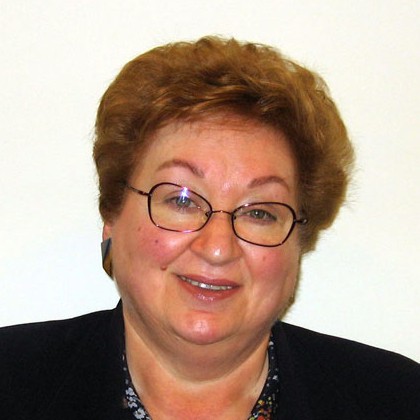 Opening
OpeningLinda Silver Dranoff
Linda Silver Dranoff is a lawyer, writer and activist.
As a lawyer she appeared at every level of court including the Supreme Court of Canada in a precedent-setting 38-year career, helping countless individuals to navigate the legal system and achieve justice.
As a writer, she provided Canadians with access to accurate, understandable, and empowering legal information through her 25-year stint as a columnist (“Ask a Lawyer”) at Chatelaine, and as the author of Women in Canadian Law, Every Woman’s Guide to the Law, Every Canadian’s Guide to the Law. Most recently, she wrote a memoir and history of the second wave women’s movement, Fairly Equal: Lawyering the Feminist Revolution.
As an activist, she successfully pressed for family law and other social justice reforms. She spearheaded the campaign resulting in Ontario’s Family Law Act 1986, which provided for equal sharing of property accumulated by husband and wife during marriage, among other advances for women.
She was the founding chair of the Feminist Legal Analysis Section of the Ontario Bar Association (now a national group called the Women Lawyers Forum), a place for women lawyers to meet and work on systemic legal problems affecting women.
She has been honoured by the Law Society of Ontario with the Law Society Medal, by the Governor-General with the Award in Commemoration of the Persons Case, by the Toronto Y.W.C.A. with its Award for Woman of Distinction in the Professions, by the Women’s Law Association with its President’s Award, by the Canadian and Ontario Bar Associations with the Commitment to Equality Award, Distinguished Service Award, as well as the Family Law Award of Excellence. Her alma mater, University College at the University of Toronto, included her in its initial group of 100 Alumni of Influence since the founding of UC.
She was made a member of the Order of Canada in 2012 and the Order of Ontario in 2019. Her association with Hart House traces back to her first year as an undergraduate at the University of Toronto, when Hart House was closed to women. Linda and a few other women picketed outside Hart House to protest exclusion from the significant debate between then Senator John F. Kennedy and then second year student Stephen Lewis. She will tell you about that today.
-
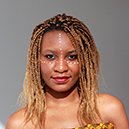 Opening
OpeningRuvimbo Mutangadura
Ruvimbo Mutangadura is an alumnus of the University of Toronto's MA Political Science Program. During her time as a student, she was a proud member of the Hart House Podcasting team, an experience that shaped her graduate experience and has also had a profound impact on her career trajectory and motivated her to start her own podcast, RadioRue.
As a black African woman, the stories she is most interested in highlighting are those that focus on dismantling and challenging the traditional, monolithic narrative of Africa and other places that are not the West, as well as stories that show the agency, brilliance and intersectionality of black women and women of colour. Ruvimbo currently works at an organization called Assuris as a Corporate Governance Specialist.
-
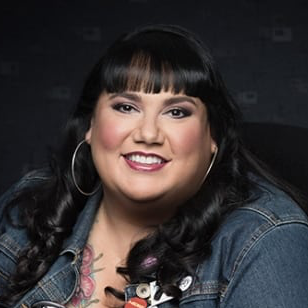 Moderator
ModeratorCandy Palmater
Candy is a recovered lawyer turned feminist comic. She is an actor, writer, columnist, international speaker, activist, comedian and multiple award-winning TV and radio personality, and has executive produced three films on Mi’kmaw culture.
Candy is the creator and star of her own national, multiple award-winning TV series, The Candy Show (APTN). She has a role on the Trailer Park Boys S10 (NETFLIX), appeared in Call Me Fitz (HBO Canada) and Sex and Violence (OutTV), and received a Screen Nova Scotia nomination for her role on Forgive Me (Superchannel). She’s a Broadcaster with CBC Radio One where Candy has hosted: The Candy Palmater Show, Q, DNTO and appears on Because News and The Next Chapter. You can hear Candy’s voice as the Narrator of CBC TV series True North Calling, and was a Panelist on Canada Reads 2017.
Candy has written and hosted many broadcasts including Ab Day Live, the Indspire Awards, and the imagineNATIVE Film Fest Awards Show.
Candy was valedictorian of her class at Dalhousie Law School and went on to practice Labour and Aboriginal law in a large corporate firm until show biz came knocking.
Before pursuing entertainment full time, Candy directed First Nations education for the Nova Scotia Department of Education for a decade. She is currently working on a Masters of Education at St. Francis Xavier University and has taught in the Transition Year program at Dalhousie University.
Candy spends most of her time in airports and airplanes as she travels the globe speaking to audiences, large and small, about the power of love, kindness and self-acceptance. Candy believes we are more alike than different and that you can NEVER have too much Candy.
Candy has just signed a deal with Harper Collins. They will be publishing her first book in the spring of 2020.
Candy is currently taping Season One of her Podcast, Sweet Talk with Candy Palmater, that will be available on iTunes and on TheCandyShow.com website by spring 2019. Be sure to subscribe to the website to not miss out on the first episod
-
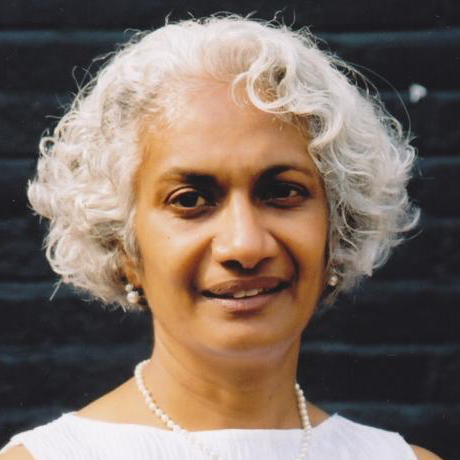
Ceta Ramkhalawansingh
Ceta Ramkhalawansingh (Dip Child Study 1974, BA 1977 NEW, MA 1980 OISE) is a human rights advocate, community activist, feminist and former city councillor. Ceta worked at Toronto City Hall from 1981 to retirement in 2010 as the corporate manager of diversity and human rights. She was appointed as a City Councillor in 2014 to fill a vacancy.
During Canada’s Centennial year, Ceta’s family moved from Trinidad and Tobago and settled in Toronto where she attended high school and the University of Toronto. While still an undergraduate, she campaigned with others to establish a women’s studies course in 1971.
Currently, Ceta is the National Chair, The Word On The Street Canada, President, LEARNXS Foundation, Chair, Harold Innis Foundation and Honorary President, Grange Community Association. Ceta is a board member of the Toronto Foundation, Diaspora Dialogues and the Grange Park Community Council. She is involved at U of T through Innis College, Massey College, New College, the Women and Gender Studies Institute where she is an honorary member, and the Community Liaison Committee, which addresses land development issues.
Ceta is the recipient of several awards including the 2017 YWCA Toronto Woman of Distinction Award, the 2012 City of Toronto Constance E. Hamilton Award on the Status of Women and the 2001 U of T Arbor Award.
-
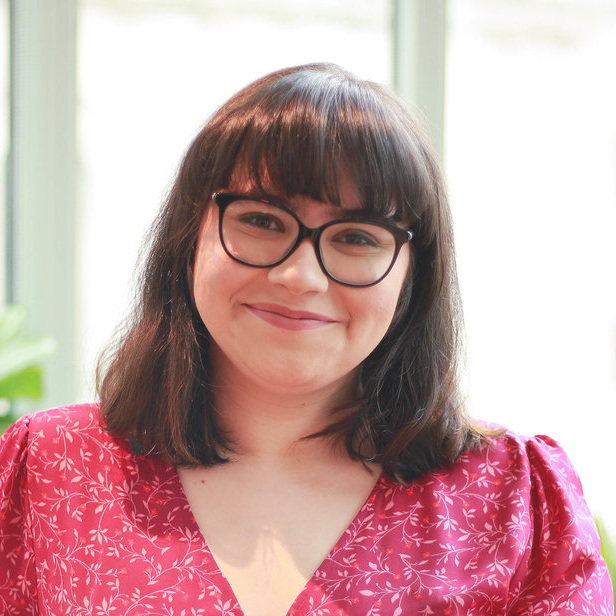
Arezoo Najibzadeh
Arezoo is a leading voice for women’s civic and political participation in Canada. As the co-founder and Executive Director of Young Women’s Leadership Network, she works with young women leaders and civic institutions to identify and address barriers to young women’s engagement and success within grassroots and institutional politics. Since 2015, Arezoo has built civic leadership capacity among 800+ young marginalized women and coached 4 millennial women candidates.
In 2018, she established ‘It’s Time’, a set of survivor-centric, trauma-informed resources for addressing sexual violence in political institutions which has provided training to more than 100 politicians, political staff, and volunteers on creating consent culture within campaigns and on legislatures. She is regularly consulted by political and civic institutions on issues impacting young women and girls, most recently the House of Commons Standing Committee on the Status of Women, The World Forum for Democracy at the Council of Europe, and the Platform Women Convention in Washington, D.C.
-
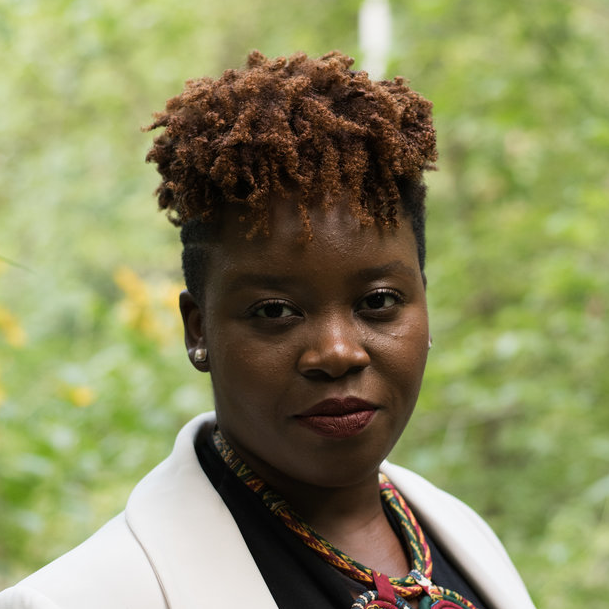
Yamikani Msosa
Yamikani Msosa is a grassroots feminist anti-violence, anti-racist organizer, part-time equity & diversity consultant and movement-based practitioner. She is currently the Coordinator for Diversity and Inclusion, overseeing the Black Academic Success and Engagement (BASE) Initiative at Humber College. She completed her Master’s degree in Women and Gender Studies at Carleton University. She has given trainings’ all over the country on issues related to Sexual Violence, LGBTQ Communities & Anti-Black Racism including Ministry of the Attorney General, Ministry of Labour, Status of Women, UN Committee on International Decade of People of African Descent, and United Nations High Commissioner for Refugees.
Yamikani has been featured in Macleans Magazine, The Walrus, Chatelaine Magazine, Now Toronto, and CBC National. She has worked for organizations such as Ottawa Coalition to End Violence Against Women, Immigrant Women Services of Ottawa, Sexual Assault Support Centre of Ottawa to name a few. Currently, Yamikani sits on Advisory Council for the Equality Project at the University of Ottawa & is an advisory member of Match International Global Fund for Women.
Yamikani has three babies, no really.
The first is UBUNTU Consulting, which was founded in 2015 to focus on equity, anti-oppression and inclusion training and organizational development for grassroots organizations and non-profit agencies. The second is SEEDS Yoga a five-week series for folxs affected by sexual violence. SEEDS focuses on empowerment, community care and consent. The third is the bi-weekly podcast called Unanonymous, where she talks about all things related to sobriety, as she is 4 years sober!
-
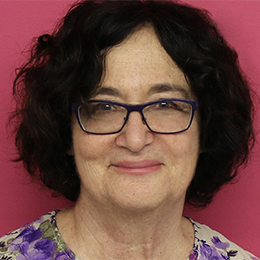
Judy Rebick
Judy Rebick is a well-known social justice and feminist activist, writer, journalist, educator, and speaker. She is the author of Transforming Power: From the Personal to the Political, Occupy This!, Ten Thousand Roses: The Making of a Feminist Revolution, Imagine Democracy.
Founding publisher of rabble.ca, Canada’s popular independent online news and discussion site, Judy continues to blog on rabble.ca. She is the former president of the National Action Committee on the Status of Women, Canada’s largest women’s group, and was the first CAW Gindin Chair in Social Justice and Democracy at Ryerson University. During the 1990s, she was the host of two national TV show on CBC Newsworld and is a frequent commentator on CBC Radio and Television. In the 1980s, she was a well-known spokesperson for the pro-choice movement during the fight to legalize abortion. She lives in Toronto.
-
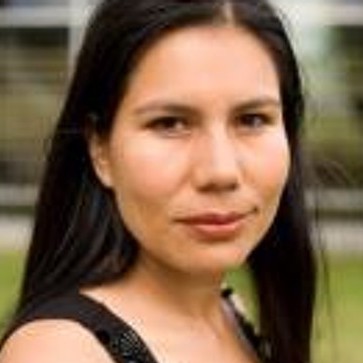
Dr. Karyn Recollet
Professor, Women and Gender Studies, U of T
Karyn Recollet is an Assistant professor in the Women and Gender Studies Institute at the University of Toronto. Karyn is an urban Cree, residing in the traditional territories of the Petun, Wendat, Mississauga’s of the New Credit, Dish with One Spoon treaty territory. Karyn’s research explores the various intersections of Indigenous artistic activations rooted in the multiple layered Indigenous territories that are urban spaces. Karyn’s focal points are choreographic fugitivity, Indigenous futurities, and decolonial love. Karyn’s publications include articles Glyphing Decolonial love, Gesturing Indigenous futurities, and has coedited alongside Eve Tuck, Native Feminist Texts (a special edition of English Journal). Karyn is currently working on a manuscript entitled Urban glyphs: fugitivities, futurities, and radical decolonial love.
-
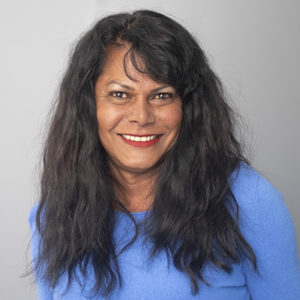
Yasmeen Persad
Yasmeen Persad is a trans woman of colour originally from the Caribbean. She is a member of The 519’s Education & Training team and has been providing education on 2SLGBTQ-related issues and taking up trans-activism for the past 15 years. Her experience ranges from working with Trans Youth, HIV Positive Women, Sex Workers and many diverse populations. She coordinate The 519’s Trans People of Colour project as well as providing training to front-line shelter workers around Trans community inclusion and support. Yasmeen has presented at many universities across North America on various topics about access for Trans people. She has been part of ground-breaking recognition of trans women as women in the Violence Against Women sector.
